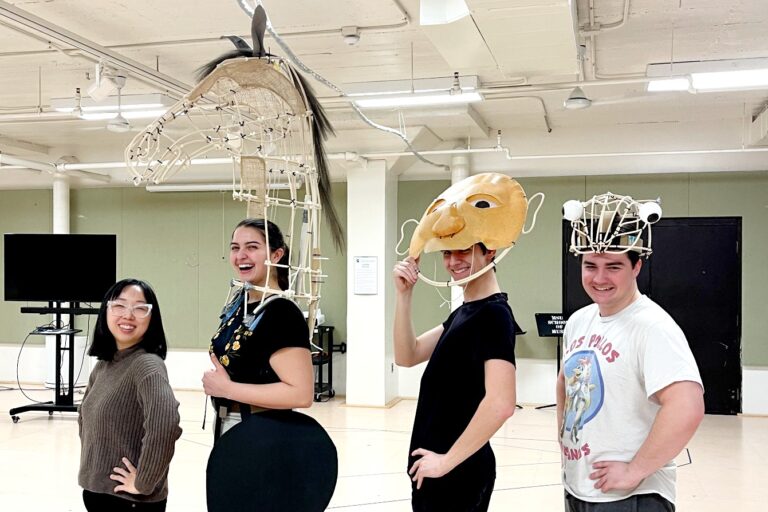The 2023 MSU Humanities and Arts Research Program (HARP) large-scale development grant has been awarded to Ryan Patrick Welsh, Assistant Professor of Media Acting in MSU’s Department of Theatre.
The $100,000 grant will assist with the development of a feature-length film adaptation of Welsh’s 2018 stage play, Last of the Wild Buffalo. The film will be Welsh’s second full-length narrative film as writer and director.
The HARP grant is funded through MSU’s Office of Research and Innovation to assist faculty engaged in large-scale arts and humanities projects. It is intended to support development of those projects likely to enhance faculty and university reputation and result in international distribution.

Welsh’s play is a focused commentary and rebuke of toxic masculinity in its many forms, framed by the story of two estranged brothers who reunite in their childhood home over the holidays. Set entirely in the brothers’ former bedroom, the play explores the destructive force that is toxic masculinity with the brothers drawn as extreme and opposite examples.
Adapting the play to film will be an exploration in how to approach a topic so it is impactful in either medium, according to Welsh.
“Theatre’s emphasis is on dialogue and how characters reveal themselves through what they say,” Welsh said. “Film allows crafting of a visual narrative that can expand the characters’ world beyond the stage set, adding greater insight and depth to the action.
“Creating a film adaptation of the play will draw a straight line between how the work of theatre can be connected to the work of film. This adaptation will be the clearest, and most important example of my philosophy as an artist and an educator.”
Ryan Welsh, Assistant Professor of Theatre
“A keystone of my pedagogy is to embrace the similarities and differences between stage and screen while allowing each to inform the other. Creating a film adaptation of the play will draw a straight line between how the work of theatre can be connected to the work of film. This adaptation will be the clearest and most important example of my philosophy as an artist and an educator.”
Festival screenings are the primary means of distribution for new independent films, and Welsh’s past work has earned accolades at such notable festivals as the Austin Film Festival, Dances With Films Festival in Los Angeles, Newport Beach Film Festival, Phoenix Film Festival, FilmQuest Festival, LA Shorts Film Festival, and Deep in the Heart Film Festival in Texas. Based on past success, Welsh anticipates wide distribution for Last of the Wild Buffalo. He already is in talks with his Los Angeles producing partners on his first feature-length film, When We Get There, about the possibility of continuing their collaboration through the distribution of Last of the Wild Buffalo.

A successful high-level festival circuit plus a guaranteed minimum distribution through a production company will garner favorable attention for Last of the Wild Buffalo, bringing visibility and esteem to the work being done at MSU, according to Welsh.
“Projects of this nature that reach an audience far beyond the walls of Michigan State University can be a boon in efforts to distinguish ourselves from peer institutions,” Welsh said.
“The HARP program has a long history of supporting research and the production of written and performed works by our humanities and arts faculty,” said Charles A. Hasemann, Ph.D., Associate Vice President for Innovation and Economic Development. “We have seen some great successes stimulated by this funding – like national book awards and Grammy nominations.
“We established the ‘Large-Scale’ HARP award out of a recognition that some projects simply require a bigger lift than the traditional HARP program could afford.”
Charles A. Hasemann, Associate Vice President for Innovation and Economic Development
“We established the ‘Large-Scale’ HARP award out of a recognition that some projects simply require a bigger lift than the traditional HARP program could afford.”
The grant funds will be used to assist development, supporting initial phases of film production, as well as positioning the project to acquire funding from other sources. The broad timeline for development is from fall 2023 and throughout 2024, with festival and online distribution occurring in 2025, accompanied by academic exhibition.
Both HARP large-scale grant awards have gone to film projects, noted Hasemann. In 2022, the inaugural large-scale grant was awarded to Safoi Babana-Hampton, Professor of French and Francophone Studies in the Department of Romance and Classical Studies for her documentary project Spectral Visions of the Atlantic: A French Caribbean Odyssey of the Black Voyage, and this year the award goes to Welsh’s film project Last of the Wild Buffalo.
“I just can’t wait to see both of them on a big screen,” Hasemann said. “And who knows what next year’s competition will yield. There is so much talent here at MSU.”
For a list of other HARP recipients from 2023, visit the announcement page detailing the scholars and their projects.
Written by Kathleen VanderVelde. Article originally published March 21, 2023, by the MSU Office of Research and Innovation.


